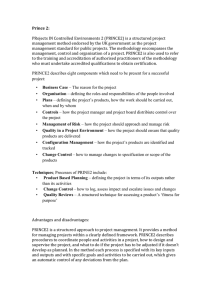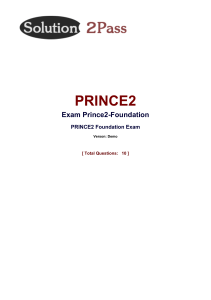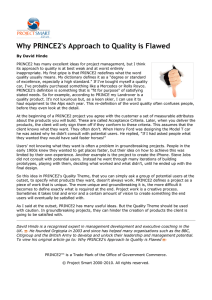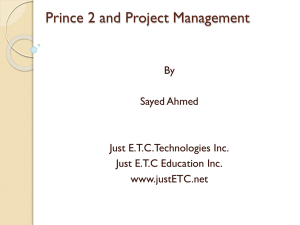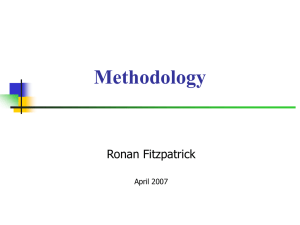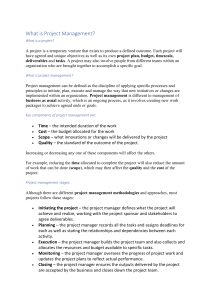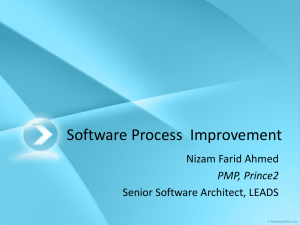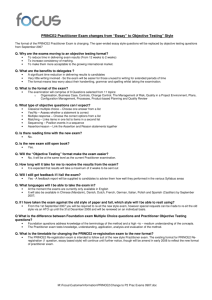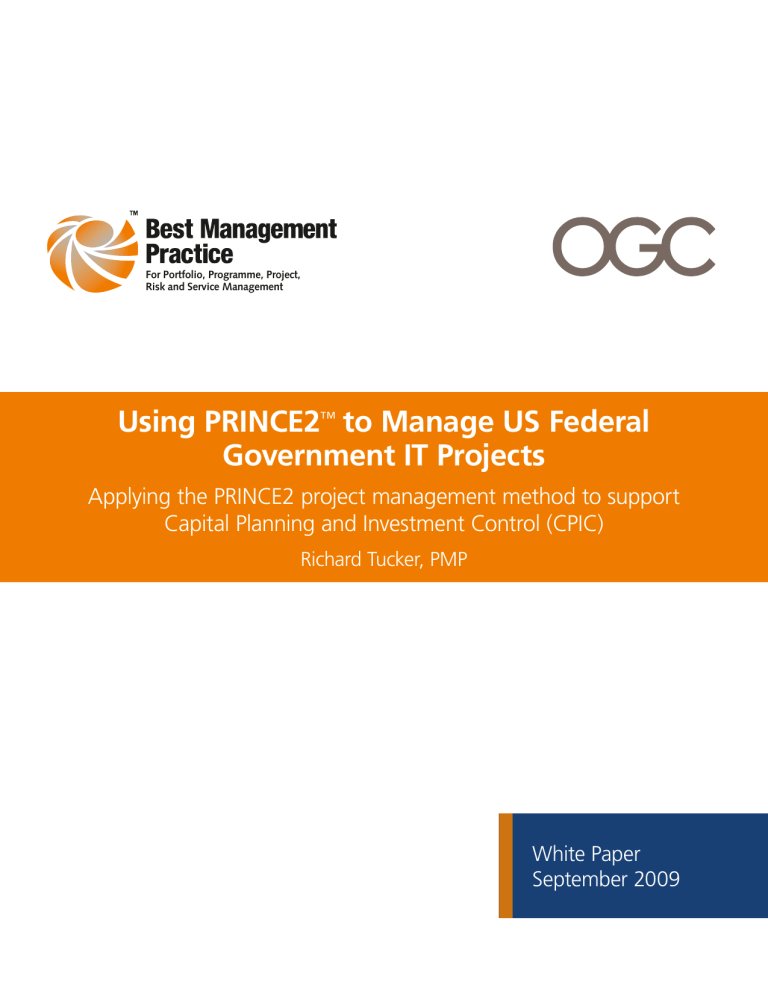
For Portfolio, Programme, Project, Risk and Service Management Using PRINCE2™ to Manage US Federal Government IT Projects Applying the PRINCE2 project management method to support Capital Planning and Investment Control (CPIC) Richard Tucker, PMP White Paper September 2009 2 Using PRINCE2 to Manage US Federal Government IT Projects Abstract This paper shows how the PRINCE2 project management method supports US Federal government project managers as they deliver IT investments while satisfying requirements of the Clinger-Cohen Act and Capital Planning and Investment Control. Since enactment of the Clinger-Cohen Act (CCA) in 1996, the US Federal government requires its agencies to improve their management, oversight and control of investments in information technology. Central to the CCA is an obligation for agencies to select, control, and evaluate their portfolio of IT projects in accordance with the principles of Capital Planning and Investment Control (CPIC), an approach to IT investment management referenced in the CCA. In the same year the CCA was signed into effect, the UK government released PRINCE2™, a principles and themes based project management method designed to provide direction and oversight of government/contractor projects. Project managers can find it difficult to meet the requirements of CPIC while running a project. Industry leading project management guides suggest one approach, contractors have another, while investment oversight groups within the agency reinforce the additional requirements of CCA onto the project team. Capital Planning and Investment Control The Information Technology Management Reform Act of 1996, commonly referred to as the CCA, requires US Federal agencies to “identify and collect information regarding best practices” for managing IT related projects. The CCA identifies the government’s approach to information technology investment management as Capital Planning and Investment Control (CPIC). Specifically, the CCA, through oversight from the President’s Office of Management and Budget (OMB), requires each agency to institute effective and efficient capital planning processes for selecting, controlling, and evaluating their investments in IT projects. These projects represent the strategic investment in IT capital assets that define an agency’s IT portfolio. OMB requires each agency to institute effective capital planning. The CCA references use of a three-phase cycle for capital asset management to provide oversight of investment budgeting and spending. First, by selecting IT capital asset investments that will support core mission functions performed by the Federal Government; Next, through controlling their projects effectively through the application of best practices in project and performance management; And then, by evaluating investment results through a demonstration that the return on investment is supporting initial business case objectives. CPIC links the strategic planning of mission attainment to the tactical performance of project delivery and IT systems operations. The three phases of CCA’s IT Investment Management process are performed annually, and applied to IT investments continuously, throughout the life of an asset’s existence within the agency’s IT portfolio. Select, Control and Evaluate During the Select phase, the agency determines investment priorities according to their mission needs, and makes decisions about which technology initiatives (new and ongoing) they will fund for the next fiscal year. The Select Phase determines which projects are to be included in the agency’s IT portfolio for the coming year. Projects identified as significant to the mission (a major investment) must include a comprehensive business case that supports the IT portfolio selection process. Select Control Evaluate IT Investment Management Cycle The Control phase is an ongoing investment management process designed to monitor the progress of IT projects against budgeted cost, schedule, performance goals, and expected mission benefits. The Control Phase helps to ensure that each investment is properly managed toward the intended objectives defined by the investment’s business case. However, the Control process does not manage the investment project. The responsibility to define a project management governance model is left to the agency and the project manager. It is not defined by CPIC. In the Evaluate phase, project outcomes are measured, and systems are determined to be fit for purpose. Performance results are assessed to: (1) identify needed changes to products or systems to maintain optimal business operations; (2) measure the project’s effect on mission and strategic goals; and (3) continuously improve the agency’s investment management processes based on lessons learned, self-assessments and benchmarking. The Challenges of CPIC Interpretation of the CCA and CPIC has led to conflicting and competing solutions to satisfy its many requirements. OMB continues to amend their supporting Circular A-11, which keeps agencies’ reporting requirements a moving target. Using PRINCE2 to Manage US Federal Government IT Projects Agency responses to these changes are often seen as adjustments in the project management processes and tools used to control the investment. Such a response weakens an agency’s ability to mature their project management practices. Instead, agencies should continue to develop and mature their project methods and tools, while adjusting reporting output to match the OMB A-11 annual requirements. Practitioners often confuse the cyclical phases of the CCA’s Select–Control–Evaluate as a project management lifecycle, for example, thinking that a project is in development activities only during the Control phase. This is inaccurate. The three phases of the CPIC IT Investment Management lifecycle define the sequence of when budget and investment management activities occur to plan, monitor and report the progress of IT investment dollars. The “project” lifecycle of CPIC has a linear progression, from Planning and Acquisition, to Management In-Use and Disposition. It starts when a business need is first defined and IT systems planning activities warrant a new project initiative, then continues to product acquisition/development, systems operation (production), and then asset retirement. In response to this, agencies should define and operate an enterprise lifecycle management framework that integrates governance, processes and information into a decision model that includes the requirements of investment and acquisition management, enterprise architecture planning, project management office (PMO), IT systems operations and maintenance, and capital asset control. CPIC defines the activities of budget and investment management. Project managers react to the oversight and governance of CPIC as a set of tasks and requirements that are in addition to their effort to running the project. This has led to frustration while project mangers work to deliver their projects. Project managers sometimes view CPIC reporting as a “check the box” activity. Maintaining compliance to CPIC reporting can take considerable effort if it is not integrated to the project governance approach. However, when CPIC reporting is a pre-defined output designed into the project method, CPIC becomes integral with the other daily management and decision-making activities of project management. Additional challenges face government project managers. The goals of CPIC are focused on budget management, not project management, which creates conflict in tactical management objectives. IT Investment Management support offices within the agencies are tasked with collecting and reporting financial information from the agency’s projects, while project managers focus on performance to cost and schedule milestones, earned value management, risk and issue status, and baseline change control logs. Too often, the data and information that reports project status is gathered using tools and techniques that are in contrast with the investment management reporting requirements of the CCA, CPIC and OMB. Finding a Solution to CPIC Project managers are searching for a governance model that can support both the day-to-day needs of project delivery and the requirements of CPIC investment management reporting. While the PMI’s Guide to the Project Management Body of Knowledge® is clear in identifying tools and techniques for performing project management activities, it is by its own admission “a guide rather than a methodology”, and it is not designed to address compliance requirements, such as those defined by CCA. To operate a project in a way that will achieve the needs of CPIC, project managers must utilize a method that supports sustainment of an investment business case, clearly identifies a governance process, and lends itself to regular reviews for “Go/No-Go” decisions, as required by US government IT investment management budget cycles. Satisfying the requirements and objectives of CPIC is not easy. However, with the right project management method the project manager can easily achieve the requirements 3 of CPIC while controlling and delivering the project. You must use a method that defines how and when to apply project management processes and techniques. The method must be scalable to the size of the investment, and it must define governance, tools and techniques that can balance the pulling forces that may exist between government and contractor. PRINCE2 is a de facto standard project management method from the UK government. It is public domain, available for anyone to use to manage a project, it can support the many requirements of CCA and CPIC, and it can be tailored to fit most any size project. What is PRINCE2? PRINCE2 is a structured project management method recommended for use on all projects commissioned by the UK government. In 1989, the Central Computer and Telecommunications Agency (CCTA) of the UK government first established PRINCE (PRojects IN Controlled Environments) for controlling information systems projects, but the method soon realized a greater following. The UK Office of Government Commerce (OGC), continued development of the method into what is now PRINCE2 (2009). Improvements include greater clarity of seven principles that guide behavior of the project team as they perform, streamlining of the processes defined within the method, and instruction on how to tailor PRINCE2 to suit most any project’s needs. PRINCE2 has gained wide acceptance throughout Europe and Africa, and is quickly gaining popularity in North America. ™ 4 Using PRINCE2 to Manage US Federal Government IT Projects Pre Project Initiation Stage Subsequent Delivery Stage(s) Final Delivery Stage PRINCE2 Stage-Gates for Controlling Project Delivery © Crown copyright 2007. Reproduced under licence from OGC. Figure 4.2 The development path of the business case – Section 4 Principles of PRINCE2 PRINCE2 is a scalable method that you can apply to projects of varying sizes and types. The seven principles of PRINCE2 are universal in nature, they are self-validating due to the many thousands of projects that have used the method, and they empower the project management practitioner by providing a confident approach to directing a project. Business Justification PRINCE2 projects perform continuous justification of the investment’s objectives. Project goals are tied to the requirements within the business case to validate that the project continues to serve the needs of the organization. This guides a project team through the decision-making process throughout the life of the project, which keeps progress moving toward defined business objectives. Even compulsory projects driven by legislative mandate require justification of the alternative selected. PRINCE2 provides a governance model for guiding an organization toward an effective solution. The continued business justification of high-risk UK Government projects is scrutinized by the OGC using a peer review Gateway™ process that is aligned to the way PRINCE2 supports the development and management of the business case. Roles and Responsibilities PRINCE2 defines the roles and responsibilities of all stakeholders at all stages and processes of the method. Participation from investment oversight board members, executive sponsors, the project board (team), the project manager, team managers, suppliers, and change control authority is clearly identified throughout the PRINCE2 method. The activities necessary for sponsoring, directing and managing the project are not left to chance. Manage by Stages A PRINCE2 project is managed in stages, providing control points throughout the project lifecycle. The project manager plans, controls and progresses the project using a stage-gate approach. A high-level project plan is supported by detailed stage plans. Tranches that extend beyond the horizon remain at a high level until near-term work is completed to a degree of certainty that improves likelihood of the investment achieving its goals and objectives. Management by Exception Deviations experienced during a PRINCE2 project are managed by exception by developing plans to identify variance from baseline. Tolerances for cost, schedule, quality, scope, risk and benefit are delegated to the project management team, providing an efficient use of resources to deliver with fewer interruptions. Decisions are made at the right level, while issues outside of tolerance are escalated only when necessary. Product Focused A project exists to produce output, not to perform activities. PRINCE2 focuses on defining and delivering only those products that are within the scope of the project mandate (charter). PRINCE2 uses a product breakdown structure to clarify the purpose, composition, source, type, and quality expectations of a final solution that will fulfill the business case, defined to satisfy the organization’s mission. Learn from Experience PRINCE2 is an experiential process. Performing regular lessons learned reviews is a key activity to success with PRINCE2. While a project is, by definition, a unique endeavor, the approach to running a project is based on repeatable themes, processes, and reusable tools. When starting a project, the project manager leverages the experiences of past projects, including reuse of approaches, performance data for benchmarking metrics and targets, defining work plans, and estimating cost and schedule milestones. Tailored to fit, PRINCE2 can best serve and support a project regardless of size, type, organization or culture. Adapting the PRINCE2 project management approach to the situation ensures alignment of processes, tools and techniques, to best support and govern the project, while avoiding success through heroics or forced compliance to process. PRINCE2 can be right-sized to the complexity and nature of the project environment. PRINCE2’s use of principles based project management directs the decision making process. The PRINCE2 Stages and Process Areas PRINCE2 is a process-based method designed to direct, manage and deliver a project to plan. The project team performs across seven defined process areas to perform the many activities for delivering the objectives of the business case. PRINCE2’s seven processes integrate with one another by following a stage-gate lifecycle framework. Using PRINCE2 to Manage US Federal Government IT Projects This provides cadence to project management activities, directing results toward pre-defined goals, and success. In the Pre-project Stage, the investment’s business objectives are determined by performing the activities in the Starting up a Project (SU) process. The business justifications for the investment are determined, scope is defined, and alternatives are analyzed. Through performance of the SU process, the business case is established, readying the project team to obtain authority to proceed with the investment. In the Directing a Project (DP) process, the project is reviewed and approved by an executive review board to place the investment in the IT portfolio. DP processes manage the business case for the duration of the project lifecycle by providing seniorlevel oversight of the investment’s progress. The Initiation Stage continues the DP process to provide regular oversight and ad hoc direction of project activities. Upon approval to proceed with the investment, the Initiating a Project (IP) process establishes a solid foundation for achieving project success through the identification of project objectives and business benefits. IP also instructs the team to tailor project plans and invoke governance over project activities. Plans to control communications, scope, cost and schedule, risks and issues, quality, and product configuration management are all supported by PRINCE2. Techniques from other industry-popular project management guides easily integrate with the processes of PRINCE2 to monitor and control the investment. As the Initiation Stage completes, the Managing a Stage Boundary (SB) process calls for the project manager to plan the next stage of the project. The project manager performs a business case review, updates the project plan, and reports status of the investment to the project board. Subsequent Delivery Stages follow the Controlling a Stage (CS) process. CS provides guidance to the project manager to authorize work to the project resources, monitor and report progress, manage risks and issues, then take corrective action on variances to the plan. The project board delegates day-to-day team activities and decisions to progress the project on a stage-by-stage basis. Activities of the CS process assigns work to team members to ensure that they remain focused on delivering the products and goals of the project plan. The Managing Product (MP) Delivery process provides direction to the team members. As products are delivered, achievement to design specification is assured; the business case is reviewed for relevance to mission, and then the Pre Project Initiation Stage Directing stage plan is completed. The SB process is again used to report and close the stage, and then subsequent Delivery Stages in the project plan repeat the CS and MP processes to continue solution fulfillment. The Final Delivery Stage completes activities from the CS and MP processes during this last phase of the project. Then, using the Closing a Project (CP) process, the project manager performs final product acceptance testing, resolves or retires open risks and issues, reviews the investment’s performance to baseline, conducts a benefits realization review, and then recommends the project for closure to the executive investment review board. Seven Themes of PRINCE2 Project management provides little value unless it is performed with predefined intent. PRINCE2 identifies seven themes that are linked to project management. Each of the seven themes in the PRINCE2 method remains in effect during the entire project lifecycle. They are referenced according to a predetermined workflow of the method to minimize risk, and to heighten the quality of team performance and results. Subsequent Delivery Stage(s) Final Delivery Stage DP SU Managing Delivering SB IP 5 SB CP CS CS MP MP The PRINCE2 Stage-Gate Management Model © Crown copyright 2007. Reproduced under licence from OGC. Figure 11.1 The PRINCE2 Processes – Section 11 6 Using PRINCE2 to Manage US Federal Government IT Projects Business Case Quality Risk A project initiates with a need to drive transformation through an organization to fulfill new or evolving mission requirements. The business case defines why a project exists. PRINCE2 uses the business case to carry requirements through to fulfillment, while maintaining the project team’s focus on objectives. The criteria under which project products are verified and accepted must be established early in the project lifecycle. PRINCE2 applies the tenets of quality management at the start, where they are central to project delivery, making the final product fit for purpose. This supports achievement of desired benefits defined by the business case. A robust quality management approach reduces the likelihood of discovering product performance issues when it is too late. Risk management is a key tenet of PRINCE2. It identifies, assesses, and controls uncertainty that may affect project outcome. Risk planning starts early in the PRINCE2 method, where it is first used to mitigate project threats while initiating the project. Where other project management standards offer a model for managing risk, PRINCE2 defines the procedures, tools, and techniques for performing the risk process. Organization The PRINCE2 method defines roles and responsibilities at multiple levels for directing, managing and delivering a project. A PRINCE2 project’s organization structure includes the executive oversight, project board, program sponsorship, senior users, suppliers, team managers, support staff, and project assurance personnel. Projects must often share resources with other parts of an organization. Clear identification of the extended project team reduces confusion and minimizes conflicting demands on staff as they serve multiple requirements across the business. Plans A plan is not just a schedule, but also a holistic approach to governance. PRINCE2 projects follow defined and approved plans that integrate requirements, cost, schedule, quality, risk, roles, resources, and communications. Performance to plan is measured in each stage of the project. Exception Plans define deviation from baseline, which are integrated into the master plan to steer performance back toward cost, schedule and quality goals. Business Case Progress Organization PRINCE2 Processes Change Risk The PRINCE2 Themes Support Performance Quality Plans Change Since change is inevitable for almost any project, controlling variance to plan must be included in the management approach for maintaining the project baseline. PRINCE2 identifies an approach to change control that addresses issues that enter the project plan. PRINCE2 integrates change control of the project lifecycle phase to configuration management of the operations and maintenance phase. Progress The PRINCE2 method establishes mechanisms to monitor, compare, review, and report actual performance to baseline objectives. Risks are mitigated, while quality issues and problems are addressed and corrected. Upon successful completion of scheduled goals, the next stage plan is authorized, progressing the project toward completion. Numerous reporting templates are defined by PRINCE2, that include definitions of each report’s contents and use, all supported by the various processes within the method. The Capital Planning Lifecycle of CPIC So, let’s go back. The Clinger-Cohen Act directs agencies to manage their IT budgets by measuring the return on investment using a Select-Control-Evaluate process. CCA also directs OMB to perform oversight of agency IT spending. In response to CCA, OMB recommends that agencies apply planning, acquisition, management, and disposition lifecycle controls to their major Using PRINCE2 to Manage US Federal Government IT Projects 7 Integrated Project Plan Business Requirement Planning & Budgeting Acquisition Management In-use Disposition IT System Requirement IT Investment Management Cycle Select Control Evaluate The Capital Planning Lifecycle IT projects. Simply put, each agency must have a defined plan for buying, building, operating and retiring their IT assets, and they are accountable to report project status timely and accurately. OMB annually releases Circular A-11, a budget management directive that requires agencies to report their annual IT budget (using the Exhibit 53 form) and report progress toward goals within the business case of each major IT project (using the Exhibit 300 form). However, A-11 does not define, nor prescribe, a project management method or approach for tactically controlling and delivering the project. Circular A-11 is only a process for reporting status of the budgeted and funded investments. OMB provides agencies additional direction in their A-11, Part 7 Supplement: Capital Programming Guide (CPG). The objective of the CPG is to show agencies how project management activities relate to IT investment management. It helps to answer the question, “Will this investment drive transformation of the business toward the agency’s mission?” The CPG defines a Capital Planning Lifecycle: a four-phased approach to IT investment management. The lifecycle identifies strategies to achieve greater service delivery and move program effectiveness toward mission goals. The CPG recommends use of risk management, earned value management, quality assurance and control, and other project management techniques. However, these are only broad brushstrokes of guidance for the project manager. The CPG does not define a project management method that must exist beneath these phases. So then, how can project managers lead their projects toward success while meeting the requirements of CPIC? The CPG’s objectives of the Planning and Budgeting phase are designed to support IT investment decision-making. Alignment of strategic planning to project performance goals is determined by utilizing an agency-level enterprise architecture plan. An Integrated Project Team (IPT) is established to manage the project. The IPT formulates a clear definition of system functional requirements, performs an analysis of alternatives to select the best technology solution, and establishes operating and reporting baselines. They must apply risk management techniques to reduce the chance for incurring costs associated with delivery failure, and integrate earned value management (EVM) into the contract acquisition strategies. The agency implements an executive review process to oversee investment performance and adjust the investment as the needs of the mission change over time. Upon completion of a comprehensive planning effort to define an integrated project plan, the agency presents its proposed budget to OMB during the Select phase. Approved through the President’s budget, the initiative receives funding from Congress to become a sanctioned project ready for acquisition. Quality and risk management are central to PRINCE2, initiated during the Starting up a Project and the Directing a Project processes of the Pre-project stage. The PRINCE2 method supports the CPIC Planning and Budgeting phase through development of the project business case. The project manager justifies the business case to ensure that the investment is planning to build the right product, is fulfilling the right business need, and that the final products will serve the organization’s mission. Once the business case is reviewed and accepted by the investment board, the project is authorized to proceed to the Initiation Stage. PRINCE2 keeps a focus on the business case to maintain IT business value. CPIC’s requirement for EVM necessitates a “deliverables-based” work breakdown structure to define project scope. During the PRINCE2 Initiation stage, the product breakdown structure becomes the framework for managing solution delivery. Activities of the PRINCE2 Directing a Project process establish oversight and governance to lead investment plans toward mission goals. 8 Using PRINCE2 to Manage US Federal Government IT Projects PRINCE2 Stage-Gate Project Management Initiation Stage Pre Project Final Delivery Stage Subsequent Delivery Stage(s) Integrated Project Team Planning & Budgeting Acquisition Management In-use Disposition IT Investment Management Cycle Select Control Evaluate PRINCE2 Project Management for CPIC In the Acquisition phase of the Capital Planning Lifecycle, the project team validates decisions and objectives from the Planning and Budgeting phase. The team re-examines the mission needs to affirm investment justifications in the business case to determine a “build versus buy” acquisition strategy. The IPT addresses acquisition risks, and then the project is initiated. Teams are established, contract support secured, and then development activities of the Acquisition phase commence. An Executive Review Committee (ERC) assesses the project team’s plan for solution delivery. Following a successful procurement, the IPT operates project governance that integrates scope, cost, schedule and quality into a comprehensive project management approach. EVM is used to monitor and control planned and actual results of both government and contractor resources applied toward development activities. Once the integrated project plan is approved by the ERC, a baseline is recorded as the project plan. The Control phase of CPIC is used to measure and improve investment performance. It instructs project managers to perform regular monitoring of product development progress, cost, schedule and performance variance, review of scope within the work breakdown structure, and assessment of risk to the investment. Change control must be applied to maintain progress toward contractual scope. Investment control and oversight is in the hands of the project manager during the Control phase. Periodic status reports are brought to the ERC. As part of the CPIC Evaluate Phase, the IPT and ERC conduct reviews of project progress to reaffirm the acquisition decision. The ERC recommends corrective action plans where necessary to keep the project moving toward its strategic and mission goals. Solution acceptance activities of the Acquisition phase include a complete review of delivered products to affirm that they meet all requirements and objectives defined by the business case. Product quality reviews, system testing, and recording IT assets into a configuration management baseline also happen. Any product deviations discovered during solution acceptance are addressed through rework or an accepted variance to plan. Additionally, contract performance requirements are assessed to determine the contractor’s success to the cost, schedule and performance goals of the contract. PRINCE2 uses a stage-gated approach to controlling project progress. Using PRINCE2 to Manage US Federal Government IT Projects The PRINCE2 Controlling a Stage process continues to provide justification of Acquisition phase activities performed during Subsequent Delivery Stages. The PRINCE2 processes provide oversight of product development activities, guiding the project team as they fulfill business case requirements. The project manager conducts a review of the investment’s status to the detailed business case. Impact assessments are performed on any new or existing risks and issues. The project manager assesses progress towards cost, time, quality and benefit goals. Exception plans are introduced to address and correct variances to baselines. The project manager reviews completed work packages against defined specifications. Configuration records and stage plans are updated upon acceptance. Then, following the Managing a Stage Boundary process at the end of each Delivery Stage, the Project Board authorizes continuation to the next stage plan for the project. Management In Use and Disposition Once the IT system goes into production, the Evaluate Phase of CPIC prescribes that the project manager performs regular Operational Analysis (OA) to measure investment performance to predefined goals, and to determine, measure and report on the return on investment. Operational Analysis requires regular monitoring of achievement toward original business objectives. Performance goal baselines are defined, thresholds set and measurements taken to improve service over time while driving operational costs down. This continues until the asset is taken out of service (retired) during the Disposition Phase. Management in Use involves post project operations of the IT system. To enter this phase of the Capital Planning lifecycle, the delivered IT solution must meet the defined requirements of PRINCE2’s Product Descriptions. The IT solution must also perform to the objectives of the business case. The PRINCE2 Managing Product Delivery (MP) and Closing a Project (CP) processes ensure that the project has met its requirements and is ready to enter the final phases of the Capital Planning lifecycle. In Summary Since introduction of the Clinger-Cohen Act in 1996, agency CIOs and project managers across the US Federal government have been working to improve their IT investment management practices. The OMB A-11, Part 7 Supplement: Capital Programming Guide provides project managers guidance on the four phases of the Capital Planning Lifecycle, while oversight performed using Capital Planning and Investment Control monitors the value returned from the dollars invested in IT assets. However, without a project delivery method that supports the control and reporting requirements of CCA and CPIC, teams continue to struggle to operate projects that exhibit best practices that produce the right measures required by OMB. Best practices defined in commercially driven project management guides fail to provide an approach that connects project management methods to the IT portfolio results defined by CPIC business cases. In contrast PRINCE2 is a scalable and proven project management method, having supported government and commercial projects for more than two decades. It supports continuous justification of the IT investment by focusing on sustainment of the business case, driving results to the organization’s mission. PRINCE2 is scalable to the enterprise, has no cost to use and supports US government IT Investment Management controls. The processes of PRINCE2 are scalable to suit various sized projects, ranging from only thousands of dollars to those that are tens of millions in scope. Project team performance is governed through stagegated project plans, measuring progress of product delivery, not activities. Most important, PRINCE2 defines the roles of stakeholders, the project board and delivery teams. It establishes governance, process and controls to bring the investment from concept to fulfillment of the mission objectives, all the while improving the project management practices of the agency. 9 Author Richard Tucker is a management consultant with more than 20 years of experience in IT project management and Federal capital investment management. He provides practical knowledge and advice to US Federal agencies and departments. He is a certified PRINCE2 Practitioner and a Project Management Professional (PMP). He is an active member of the Federal CPIC Forum and contributor to numerous online communities where he shares his interest and experiences in project management methodology and tools implementation. White Paper August 2009 Richard Tucker, PMP Certified PRINCE2 Practitioner Trademarks and Acknowledgements • PRINCE2™ is a Trade Mark of the Office of Government Commerce. • The swirl logo™ is a Trade Mark of the Office of Government Commerce. • PRINCE2 content, diagrams and logo’s are correct at time of going to press but may be subject to change without notice. • PRINCE® is a Registered Trade Mark of the Office of Government Commerce in the United Kingdom and other countries For Further Information: www.ogc.gov.uk www.best-management-practice.com www.usergroup.org.uk www.apmgroup.co.uk Our White Paper series should not be taken as constituting advice of any sort and no liability is accepted for any loss resulting from use of or reliance on its content. While every effort is made to ensure the accuracy and reliability of the information, TSO cannot accept responsibility for errors, omissions or inaccuracies. Content, diagrams, logos and jackets are correct at time of going to press but may be subject to change without notice.
